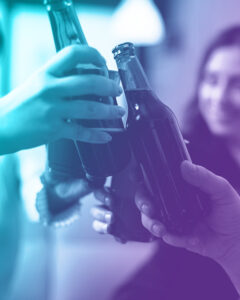Alcohol and Night Sweats
You know you can’t keep going on like this. Your drinking has gotten so out of hand that you can’t make it through the day without at least a pint. Usually, your day has to start with a beer just to stop the shakes. You know you can’t keep going on like this, and it’s time to do something about it

It is rough, and your anxiety feels like it’s going through the roof, but you make it through day one. Now, it’s time to attempt to get some sleep. As you lay down, you feel comfortable, at first. But before you know it, the room is on fire. Your heart races as you feel sweat bead on your forehead. You look down at your shirt and see a cone of sweat around your chest. This sends your anxiety into overdrive, and you jump out of bed and rummage through the cabinets to find your stash. After a big swig from the bottle, your heart seems to calm. What’s going on? Is this withdrawal?
According to an article from Yahoo! Finance, Tampa, Florida ranked 11th out of the top 30 drunkest cities in the United States. The excessive drinking rate was 21.2% this past year and the average night out of drinking cost around $82. Clean Recovery Centers understands that drinking alcohol affects all aspects of life, including physical and financial. Our program begins with a medical detox and also provides life skills classes for financial stability. Our blog is a great tool for loved ones wanting to know more about alcohol and substance use disorders. Today, we are discussing how alcohol and night sweats are related, and what to do if you are experiencing them.
How Alcohol Triggers Night Sweats
Alcohol interferes with the central nervous system, which is responsible for temperature regulation. When drinking alcohol in excess, it can feel like your body is warmer, causing you to sweat more. This is because alcohol causes blood vessels in the skin to become wider, making the skin flush and feel warm. Sweat is the body’s response to try to cool the skin down.
Despite feeling warm when drinking, there is an increased risk of hypothermia when alcohol-related night sweats are triggered. If in a cold environment, the sweating will take away more body heat and result in a lowered body temperature. This can become dangerous as hypothermia sets in.
As the liver processes alcohol, the blood vessels then begin to become more constricted. This causes blood pressure and heart rate to rise, leading to sweating. With increased sweating and urination, the body becomes dehydrated, leading to headaches and making it difficult to sleep.
Alcohol Withdrawal and Night Sweats
Experiencing alcohol withdrawal can cause different symptoms at different times. When the body becomes used to having alcohol in the system, it reacts to adjust to not having it. Night sweats are a response to the body trying to regulate blood flow. As blood vessels narrow, it becomes harder for the heart to pump blood, raising body temperature. The body will begin regulating again after a few days, and night sweats can occur for days or even weeks after alcohol consumption has stopped.
Common Symptoms of Night Sweats
Night sweats from alcohol can cause many symptoms. Common symptoms include:
- Clammy skin, especially under the arms and around the face and neck
- Increased heart rate
- Flushing of the face or skin
- Headaches
- Increased thirst
- Dehydration
- Difficulty sleeping
Whether caused by drinking or alcohol withdrawal, night sweats should go away on their own in a few days or weeks. If night sweats continue after alcohol consumption has stopped for weeks, seek medical attention. There may be an underlying condition causing night sweats to keep occurring, such as menopause, low blood sugar, diabetes, and thyroid problems.
Alcohol Intolerance and Night Sweats
 Alcohol intolerance is a genetic condition characterized by a mutation in the gene that processes alcohol. Those with alcohol intolerance typically stay away from drinking as it only takes one drink to cause unpleasant symptoms. The most common sign of intolerance is flushing of the face and neck. This can lead to increased sweating, and even cause bouts of night sweats to occur. Like those who drink regularly or excessively, those with alcohol intolerance will experience night sweats only temporarily.
Alcohol intolerance is a genetic condition characterized by a mutation in the gene that processes alcohol. Those with alcohol intolerance typically stay away from drinking as it only takes one drink to cause unpleasant symptoms. The most common sign of intolerance is flushing of the face and neck. This can lead to increased sweating, and even cause bouts of night sweats to occur. Like those who drink regularly or excessively, those with alcohol intolerance will experience night sweats only temporarily.
Alcohol intolerance often gets confused with allergies. Allergies are an immune response and may be triggered by certain ingredients in alcohol. Allergy reactions vary from person to person, but increased sweating can occur as well as difficulty breathing. Always seek medical attention for an allergic reaction.
Tips for Dealing With Alcohol-Related Night Sweats
Alcohol-related night sweats are not typically life-threatening, but can be very uncomfortable and interfere with sleep. One of the best ways to manage night sweats is to make sure the room is cool. Turn on the A/C or have a fan running to help keep cool air flowing. Try to sleep with fewer layers if possible. Keep hydrated to reduce uncomfortable symptoms from dehydration. Lastly, try to cut back on drinking or stop drinking altogether. This can help reduce the number of days you experience night sweats.
If night sweats are accompanied by other, more severe symptoms, it may be time to seek help. Delirium tremens (DTs) are a serious form of alcohol withdrawal. DTs cause profuse sweating, hallucinations, and seizures. If you have been drinking excessively for a long period of time, the risk of DTs increases. It is best to seek a treatment center that provides a medical detox to keep you safe and comfortable.
Getting Help for Night Sweats and Other Alcohol Withdrawal Symptoms in Tampa, FL
Experiencing night sweats is never comfortable, but stopping alcohol use can seem even more uncomfortable to do. Alcohol withdrawal is one of the main reasons people don’t seek help to stop drinking. The good news is that there is hope, and finding an alcohol detox can be the difference in your success. Treatment centers specialize in making detox from alcohol comfortable and safe, giving you the best start to begin your recovery. Leaving alcohol and night sweats behind can open the doors to a new beginning focused on physical, mental, spiritual, and social health.
If you or someone you love is experiencing night sweats from alcohol use, it’s not too late to get help. Clean Recovery Centers offers a full medical detox that ensures your safety and well-being to begin your recovery journey. Our program consists of a unique, three-phase approach that addresses all aspects of addiction and arms you with healthy coping and life skills. With locations along the Suncoast, our dedicated team is ready to help you get clean, live clean, and stay clean. Call us today at (888) 330-2532 to learn more about our program offerings.
FAQs
What causes night sweats after drinking?
Night sweats after drinking are caused by the blood vessels expanding and compressing. When the vessels are expanded, the skin can flush and feel warm. Sweat is the response to try to cool the body down. When the blood vessels are compressed, heart rate and blood pressure rise, causing sweating.
Can you sweat out alcohol toxins?
Alcohol toxins are released through sweat. However, increased sweating does not detoxify the body faster. The liver is responsible for alcohol processing, and most toxins are released through urine.
When should I be worried about night sweats?
If night sweats are a regular occurrence, even after you have stopped drinking alcohol, it is time to speak to a medical professional. This is especially true if night sweats are interfering with your life such as affecting sleep or job performance.
Sources:
- https://finance.yahoo.com/news/30-drunkest-cities-america-2023-130844516.html


